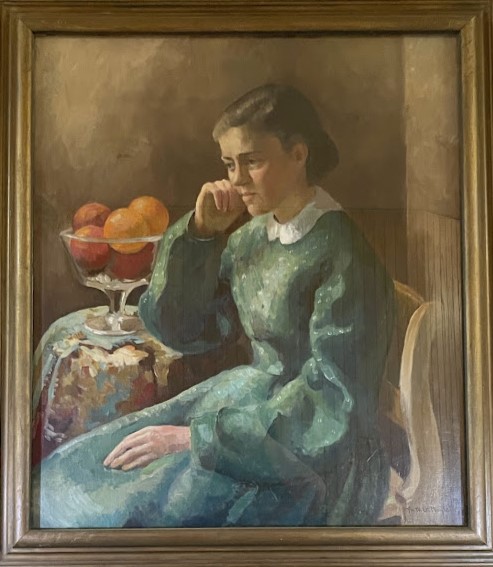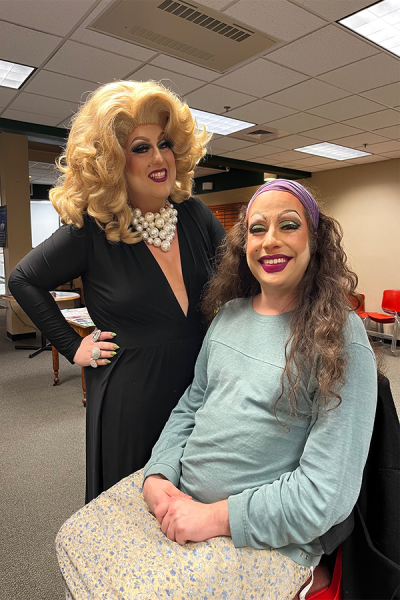Original play offers unique look at mental illnesses
The theater is dark and quiet until white lights suddenly sweep across the stage, accompanied by the sound of a car’s engine. It quiets, white lights shift to red, and the sound of a blinker is heard. After a moment, the sounds fade and the play begins.
“The Cover of a Book” is an original play written by Colton White, a JSC senior getting his B.A. in Performing Arts. His director’s note in the play’s pamphlet describes his desire to tackle the heavy topic of misunderstood mental illnesses, with the play’s focuses being schizophrenia and alcoholism.
This didn’t actually become clear in the play until at least a third of the way through its runtime. Initially, the story followed Abby (Brittney Malik) as she discovered that her step-mother was part of an evil organization — referred to simply as “them” or “they” — who was trying to steal her memory of how the universe began.
After Abby ran away from home, flashbacks showed us a different perspective of events that made it clear Abby was suffering from paranoid delusions. These flashbacks may have been more shocking to those who didn’t read the director’s note before the play started, but since I did, the plot twist was not particularly unexpected. That said, I did still find the execution of the flashbacks — disjointed, standalone scenes whose meaning is left to the audience to interpret — to be fascinating and, ultimately, effective.
The disjointed nature of the storyline was eased by the cast members’ immersive performances. Malik’s portrayal of Abby was powerful and heartbreaking, brilliantly showing the dichotomy between Abby’s view of herself and what the rest of the world saw in her.
Sam Lewis played Allen, Abby’s father. Although cast in a somewhat antagonistic light toward the play’s beginning — exhibiting misogynistic favoritism with his children and coming across as overly strict with Abby — he revealed a different side of his character after losing his daughter and falling back into alcoholism. Lewis’s performance seemed slightly over-the-top at times, making it harder to take his illness as seriously as seemed appropriate, but his earnest distress over his daughter’s well-being helped to make him a more sympathetic character.
Josh Baughn’s performance as Chris, Abby’s older brother, held arguably the most character development. Starting as a mildly annoying older sibling, his depths of compassion and determination shone through as the story progressed.
The minimalist set of the show (design by Kalob Gabree) worked well. Split into three parts, each “room” had one or two major items to convey its purpose — a bed and nightstand in the bedroom, a picnic table in the schoolyard, and two tables and a fireplace in the kitchen. The bedroom also had a “window,” which was simply a frame hung in empty space. The simplicity of the set kept the focus on the story but added just the rest amount of context.
The atmosphere felt very alien at times, particularly during scenes that took place in Abby’s delusional mindset. The lighting (Joseph David Sanguinetti) was made up largely of very focused light, leaving much of the stage in shadow. The soundscape of eerie white noise that played between scenes, accompanied by a pale blue light over the entire stage, aided in this feeling of atmospheric unease.
An unusual aspect of this show was its short runtime, coming in at just under an hour. While this kept the story from feeling stretched or dragged out, it made the ending feel abrupt. Initially, I assumed that it must be time for intermission, but then the cast came out for a final bow and I was disabused of that notion.
Not having any first-hand experience with schizophrenia, it’s difficult for me to assess the accuracy of the illness’s depiction. However, the cast brought an array of powerful performances to the stage and didn’t pull any punches in the depth of emotion in their deliveries.
Overall, this show was definitely one that I’ll remember for a while. Whether or not it properly got its message across could likely be debated at length, but I do appreciate the effort that was made toward bringing awareness to these particular illnesses, and I give kudos to the cast and crew for putting such energy into the production.







